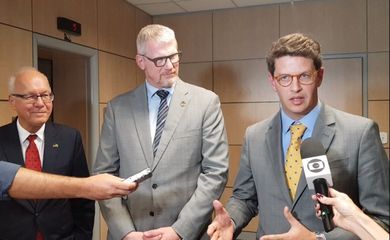Brazil environment minister argues for Amazon Fund revamp


Brazilian Environment Minister Ricardo Salles once again stressed the need for a revamp of the Amazon Fund, the biggest international initiative to preserve the 4.1 million km² forest.

Measures brought forward by Salles include reworking the fund’s “operational system” through a revision in the Amazon Fund Guidance Committee (COFA), which gathers federal officials, representatives from the nine states in the Amazônia Legal region, as well as six organizations. The committee is tasked with establishing guidelines for, and monitoring the use of, the Amazon Fund.
Amazônia Legal comprises the Brazilian states of Acre, Amapá, Amazonas, Pará, Rondônia, Roraima, in addition to part of Mato Grosso, Tocantins, and Maranhão.
Participation
“We understand that the fund managing group must participate more actively not only in the selection of projects but also in the execution and monitoring of results. This is why we plan to change the way the Amazon Fund Guidance Committee operates,” Salles said during a Wednesday morning (Aug 7) public hearing with the lower house Commission for National Integration, Regional Development, and the Amazon.
The government’s proposal, the minister reported, is to turn COFA into a consultant group. “Under its guidance, there would be an executive group, with around seven representatives, who would supervise the selection, the execution, and the outcome of the use of the resources, every two months at the most,” Salles said, describing the change as “crucial” to result checking.
Approximately $850 million has been donated to the fund, which was created in 2008, Salles noted. Top donors include Norway (some $800 million) and Germany ($50 million). The money is administered by Brazil’s National Economic and Social Development Bank, BNDES.
Goals
Under the law, the resources must be used in “non-refundable actions aimed at preserving, monitoring, and fighting deforestation and promoting the sustainable use of Amazônia Legal,” which includes the management of public forests and protected areas, environment control and inspections, property ownership regulations, and the restoration of devastated areas.
“We question whether we’re meeting the goals set by the fund,” the minister said, explaining the origins of the controversy surrounding his recent statements about the fund. In May, he went as far as to claim there were signs of wrongdoing in the management and execution of projects financed by the fund. The statements led German and Norwegian representatives to call a meeting with the minister.
During the public hearing at the lower house, Ricardo Salles said issues had been identified by BNDES experts themselves. “After the first assessment, we saw a huge—not to say absolute—deficiency in the tools for gauging the results of fund use and bookkeeping,” the minister said.
Of the $850 million earmarked for the fund, he went on to say, 50 percent has been directed, half for the state- and city-level projects, half for initiatives developed by the voluntary sector—adding up to 104 of the contracts signed since the fund was created.
Brazil’s interests
Salles referred to the $850 million donated to the Amazon Fund as insignificant “compared to the needs of such a massive region.” In his view, the fund can only be viewed from the perspective of the interests held by Brazil. “Otherwise, we’re not talking about about donations, but resources brought in under conditions, which doesn’t seem to me to be the case,” Salles argued, reiterating that it is Brazil’s job to decide on “the development model intended for the region.”
“The fund’s big donor, Norway, exploits oil in the Arctic Circle, a sensitive area. At the same time, it provides funding for NGOs that brings the debate about the exploration of natural resources in the Amazon to a halt. Notice the contradiction,” he pointed out.
The minister also advocated the search for balance and said the economic sustainability in the region must be the goal. He opposed the “view seeking to totally freeze” the Amazon, which, he said, makes “each and every activity of sustainable exploration of natural resources” more difficult.




